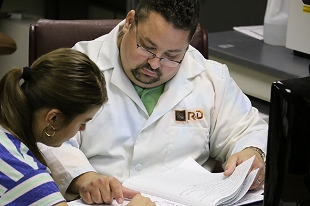Sep 15 2015
Dr. Ronald J. Tackett, faculty member in the Kettering University department of Physics, along with collaborators from multiple disciplines across campus have been awarded a National Science Foundation - Major Research Instrumentation (NSF-MRI) grant for $452,000. The grant will allow Tackett to acquire a high-resolution transmission electron microscope (TEM) with energy dispersive spectroscopy capabilities to support ongoing investigations and potentially advance materials science and nanotechnology research and teaching at Kettering.
 Dr. Ron Tackett (right) is the eighth Kettering faculty member to receive a NSF-MRI grant since 2012.
Dr. Ron Tackett (right) is the eighth Kettering faculty member to receive a NSF-MRI grant since 2012.
The award is Kettering’s eighth NSF-MRI award since 2012 which is the most of any higher education institution in the State of Michigan over that time.
“Most of my research for my entire career has been centered around nanotechnology,” Tackett said.“That’s why this instrument is so important. It’s the only instrument out there that can image things on the nano-scale.”
Tackett’s work, in collaboration with Dr. Ronald Kumon and Dr. Prem Vaishnava in the Physics department, focuses on using magnetic nanoparticles as a non-invasive treatment for cancer. Tackett measures the anti-cancer effectiveness of nanoparticles after modifying their size, properties and/or composition. Researching nanoparticles without the TEM is equivalent to being “blindfolded,” according to Tackett as he was unable to determine the exact composition and atomic structure of materials.
The TEM will allow Tackett and other researchers on campus to produce an exact image that will unveil a particles’ morphology (shape), chemical composition and material properties which will result in a “full chemical work up” of the material in question.
“The TEM will allows us to get the highest resolution,” Tackett said. “You want to have images of the material. If it’s nanoparticles, you want to have a size distribution. It’s very hard to do it without direct visualization.”
In addition to research, Tackett estimates that the TEM will enhance undergraduate student experiences in at least 15 current classes spread across disciplines such as physics, chemical engineering, applied biology and industrial engineering. Additionally, the equipment can be used to create new labs and curriculums to further enrich student experiences across multiple disciplines on campus.
“The biggest advantage is that we can train students because that’s what we are all about here at Kettering,” Tackett said.
Currently, Tackett and other Kettering faculty are sending samples out to third-party organizations or universities to be analyzed which is costly and robs students of invaluable laboratory skills and experiences. After the TEM arrives on campus in early 2016, Kettering faculty and students will be able to utilize the equipment and also provide analysis services to other colleges in the area or co-op employers. Tackett envisions a time when students can carry a project from their co-op employer to campus for further materials testing. The resulting synergy will further enhance the integration between the professional and academic experiences of students.
“If you send your samples out, you have to pay a fee and you don’t get a chance to train students, Tackett said. “This will allow us to train students. I don’t know any other institution where an undergraduate student can work with a TEM.”
Source: https://www.kettering.edu/